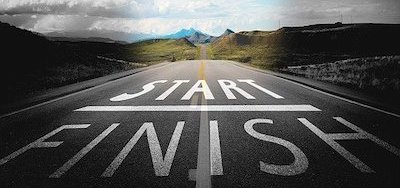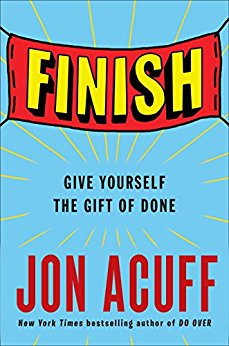“The first thing to consider is whether or not this inner voice speaking up is the voice of resistance, or the voice of intuition.”
If you’ve got writing questions, please send them my way!
I’d love to answer them for you in my column.
Helping writers make the work of writing happen

“The first thing to consider is whether or not this inner voice speaking up is the voice of resistance, or the voice of intuition.”
If you’ve got writing questions, please send them my way!
I’d love to answer them for you in my column.


 I’ve just finished reading Finish: Give Yourself the Gift of Done* by Jon Acuff. It’s a delightfully irreverent book packed with useful insights — sometimes counterintuitive — about how and why we stop ourselves from finishing (hint: perfectionism is the root cause).
I’ve just finished reading Finish: Give Yourself the Gift of Done* by Jon Acuff. It’s a delightfully irreverent book packed with useful insights — sometimes counterintuitive — about how and why we stop ourselves from finishing (hint: perfectionism is the root cause).
It’s been a particularly fun read right now for three reasons.
First, I’ve been reading it alongside several of my Circle members and we’ve been discussing it on our online site. I have a feeling we’ll be doing this again. It’s a mini online book club. Yay!
Second, I’m just about to lead the goal setting call for the Deep Dive Writing Intensive I’m running (we start writing next week!) so I’m looking forward to incorporating some of Acuff’s principles into our goal setting work. And since the Deep Dive Writing Intensive is designed to help people finish (or make major progress in that direction), it’s particularly apropos.
Third, I know I’m a recovering perfectionist. Or at least a perfectionist who’s trying to recover. (The first step is admitting you have a problem!) So this book was useful on both professional and personal fronts.
Here are some of my favorite takeaways from the book:
More my favorites in this book are the “secret rules” we use to sabotage ourselves (“If I lose all this weight, then I’ll have to go dancing/be looked at/feel more vulnerable”), choosing what to “bomb” (where you’re strategically choosing to suck at something in order to prioritize your goal), using data to track your goals and “celebrate your imperfect progress,” and many more.
While there were times I wasn’t 100% sure if I thought Acuff was actually writing about resistance and not so much about perfectionism (which I consider to be a subcategory of resistance), I loved what he shared and he has stirred some useful thinking and insight for all of us who have read it.
Highly recommended.
Looking for structure, support, and community for your writing?
We offer daily writing sprints, coaching events, and more. Join the Called to Write community here.
Copyright © 2025 · Genesis Framework · WordPress · Log in